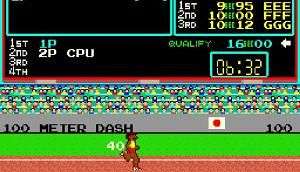Best of 2013: Virtually Reality
by Tom
First Published: July 30, 2013
Voted For By: Keegan
Reason(s) for Vote:
This article just makes a damn fine point. Games are most certainly a form of escapism for me, and this article says all the things I wish I would’ve thought up before reading it. It was written nicely, made good points, but most of all I just agreed with it.
————————————————————————————————————————————————————–
 Video games really are a wonderful thing. Each and every one opens up a world of infinite possibilities where everything that we’d only ever dreamed of in our wildest fantasies can come true. We can be great heroes, despicable villains, and outstanding sportsmen. We meet characters who make us happy, sad or angry, take part in epic quests, or compete with sporting legends and achieve fame and fortune. Our imaginations are well and truly the limit… and yet, with this in mind, why do we insist on bringing in the mundane norms of everyday life?
Video games really are a wonderful thing. Each and every one opens up a world of infinite possibilities where everything that we’d only ever dreamed of in our wildest fantasies can come true. We can be great heroes, despicable villains, and outstanding sportsmen. We meet characters who make us happy, sad or angry, take part in epic quests, or compete with sporting legends and achieve fame and fortune. Our imaginations are well and truly the limit… and yet, with this in mind, why do we insist on bringing in the mundane norms of everyday life?
They have access to worlds of endless potential, yet game developers work forever on shackling them with the structures and rigours of reality and, what’s more, they do so at our behest. They strive to get AI that will act like a real person would, they’ll work tirelessly to ensure that every fleck of paint on a car looks just right and that characters can express every single emotion under the sun thanks to having a face crammed full of a million, bajillion polygons.
It’s understandable that gamers demand a lot of their games; they want the best of everything that a virtual world can offer. It is nice when your landscapes look like a real place, and it’s great if you can drive a car that makes you feel as though you’re sat in the real thing; these are examples of realism actually bringing something to the game. Do you care that the car’s paint job doesn’t look 100% real? No, because you’re having a good time and surely you’d rather have them put their efforts into making more chances to experience this kind of thrill than fix a problem that isn’t there?
Well-known French pillock, and occasional game designer, David Cage, is a man obsessed by the prospect of using polygons to engineer the perfect, realistic human face within a video game. However, in doing so he forgets to attend to the most important parts of a game – games need to be immersive, gripping and enjoyable, but Cage-esque constructs such as Heavy Rain are still far from perfect. Yes he may have succeeded in making a sad and ugly looking old man, as he proudly displayed during the PS4 announcement, yet what’s the point if the story is neglected and, as a result, doesn’t explain or support what we see. Should anybody care if a video game character doesn’t frown in the correct manner? No, and if they do then they’re a fool.
Reality, it seems, has a scary and unnatural ability to turn its hideous gaze upon a game and drain the fun out of it like some strange, abstract vampire. Sadly, though, it isn’t just Monsieur Cage pulling the strings of the vampiric monster we call realism, others are at it too. Using realism to promote and sell games has become something of a fad, and nowadays games make a point of advertising themselves as being more realistic than ever in the hopes of catching your eye.
War games such as Battle of Duty: War of Callfare 86 all claim to offer the closest experience to warfare aside from actually picking up a rifle and stomping off to your nearest war zone like a cut-rate Rambo, but do they? Surely in a realistic war game there’d be a BANG! One gunshot and you’re dead, left to stare at a black screen until you can bear no more, leaving you to wonder why you even bothered to buy the game.
 Perhaps, then, it is the unrealistic elements of these games that makes them so fun and successful. If games were accurate representations of the real world they would be incredibly difficult and infuriating, with so many factors to consider with each decision. You could shoot that man in the face, but what about his family? Without him surely they’ll default on their mortgage and be forced to live on the streets, begging for food. What about his friends? Will grief drive them all into deep spirals of depression? I don’t think that I can I handle that; maybe I should let him kill me instead, just to keep his family and friends happy.
Perhaps, then, it is the unrealistic elements of these games that makes them so fun and successful. If games were accurate representations of the real world they would be incredibly difficult and infuriating, with so many factors to consider with each decision. You could shoot that man in the face, but what about his family? Without him surely they’ll default on their mortgage and be forced to live on the streets, begging for food. What about his friends? Will grief drive them all into deep spirals of depression? I don’t think that I can I handle that; maybe I should let him kill me instead, just to keep his family and friends happy.
Therefore it’s the very unrealistic elements of games, such as being able to take multiple gunshot wounds, that keep the difficulty down and make them less irritating. This makes sense. After all, that’s why we don’t go off and out the things that we do in video games. I may not be able to climb over a high fence in Call of Duty, yet I can in the real world… but, then again, if I got shot in reality then I doubt I’d just dust myself off and carry on with the day.
Sadly, though, game developers don’t necessarily seem to see things this way. As they continue working to fix the non-existent problems of games, words such as ‘realistic’ and ‘realism’ have become synonymous with ‘better’ and ‘intuitive’, yet I find myself asking ‘why?’ Reality can be a pretty damn boring place at the best of times, a realm of endless problems such as politics, pollution, terrorism and One Direction. Yet people continue to demand realism in their games and are swayed by the claims of “it’s so realistic that you’ll practically piss your pants while playing it” like the zombie-esque drones they are.
 Some hope does still linger in the world, however. The sadly-deceased THQ gifted us one of the best game series to ever throw reality out of the window and plunge us headlong into a world of insane action – Saints Row. With the fourth instalment of this awesomely-out-there franchise on the way, thanks to a buy-out by Koch Media, there will continue to be a little bit of insanity left in the world.
Some hope does still linger in the world, however. The sadly-deceased THQ gifted us one of the best game series to ever throw reality out of the window and plunge us headlong into a world of insane action – Saints Row. With the fourth instalment of this awesomely-out-there franchise on the way, thanks to a buy-out by Koch Media, there will continue to be a little bit of insanity left in the world.
Let’s not forget games such as Borderlands, Ken’s Rage and Bulletstorm which continue to defy rationale in the name of entertainment. Wacky, wild and zany games like this offer us all a heaping dollop of optimism that our virtual realities can hold onto their fun and wild sides.
That’s not to say that reality is wholly evil. I don’t want to live in a world where my games don’t look great, where I don’t have any challenge overcoming enemy AI, or where I encounter characters whose range of facial expressions rivals that of a soggy loaf of bread. Reality does have its benefits and, as a force of good, I’m all for it, but there is a line.
Last five articles by Tom
- Why I Hate Mario
- Best of 2013: Virtually Reality
- Best of 2013: Move, Bitch! Get Out Of The Way!
- Virtually Reality
- Soundtrack Synopsis























There are no comments, yet.
Why don’t you be the first? Come on, you know you want to!